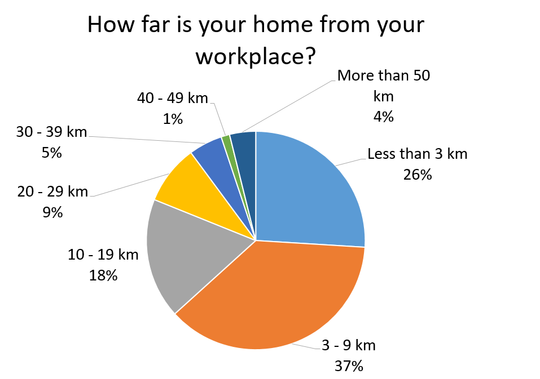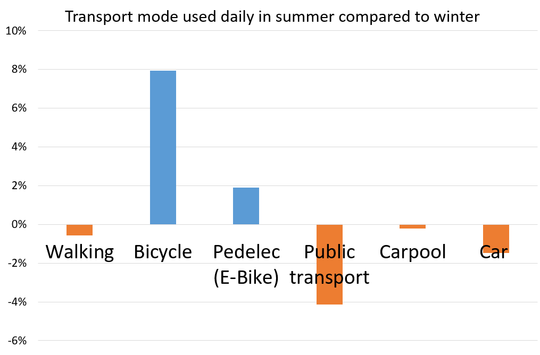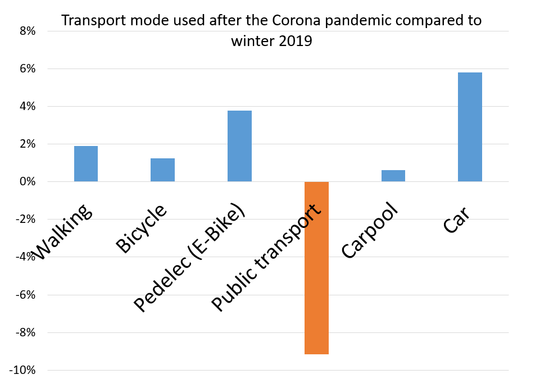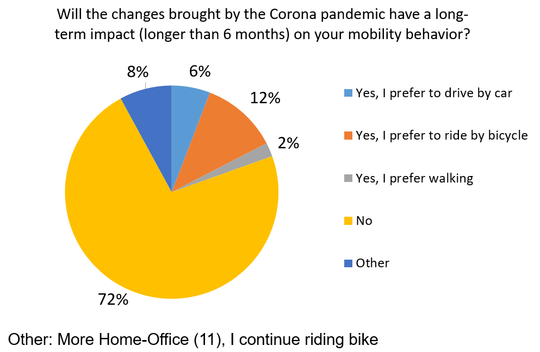Mobility survey for employees (2021)
We would like to sincerely thank all participants in the mobility survey (July to September 2021)!
We are very pleased that so many university employees participated. In total, the 1424 participants*, which represents more than 20% of all employees, provided useful insights into their mobility behavior and shared their wishes from the university, especially with regard to sustainable mobility.
The survey was conducted anonymously. As a thank you for taking part in it, participants were able to enter a raffle to win 30 water bottles made of sugar cane and 5x2 combination tickets cable car ride + breakfast on the Schauinsland.
The aim of the survey was to estimate the emissions caused by commuting and to better understand the mobility behavior of employees in order to implement more sustainable mobility measures. Currently we are working on a holistic mobility concept for the University of Freiburg, which is due to be published in 2022. The data obtained from the survey was very crucial to measure the CO2 emissions from commuting and to develop the mobility concept. A mobility survey for students is planned for 2022.
Here are some of the key findings from the survey: Resulty Mobility Survey 2021
We are pleased to report that half of the respondents indicated cycling as their primary mode of transportation to work. In addition, we asked about primary, secondary, and also third mode of transportation, as many people use a combination of modes to get to work (e.g., car and train), or choose different modes depending on the weather. Of all employees 64% named also a secondary transportation mode and 32% named a third transportation mode.
Here we show the relationship between the modes of transportation employees use in the summer compared to winter. It is clear that some employees change their mode of transportation depending on the time of year and prefer to bike, especially in the summer.
For example, 8% of the employees prefer to ride a bicycle and almost 2% more prefer to ride an e-bike only in the summer compared to winter. At the same time, more than 4% of employees travel less by public transportation in the summer.
The results on the long-term impact of the Corona pandemic on mobility behavior were very interesting. This graph depicts the difference between the modes of transportation mentioned by employees in the winter and their mobility behavior after the Corona pandemic. Only 42% answered this question. It is obvious that almost 10% of the employees avoid using public transport since the pandemic began.
A similar question with multiple responses was answered by all participants:
72% indicated that they had not changed their mobility behavior. The survey showed that since the Corona pandemic, many more employees work in home office, which has had a fundamental impact on mobility, while some prefer bicycles or cars to public transportation since the pandemic began. Since the Corona pandemic, University employees work an average of 7 days per month in the home office compared to only 1.5 days per month before the pandemic began.
In addition, various perspectives on the topic of mobility were expressed through the numerous free text comments written by participants. These ranged from criticism of incentives for bicycle use, such as the free bicycle check offered by the university, which lacked a counterpart for motor vehicles, to enthusiasm for sustainable mobility: "I love my bicycle. It can take me everywhere".





